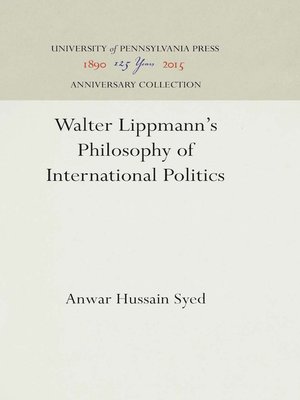Walter Lippmann's Philosophy of International Politics
ebook ∣ Anniversary Collection
By Anwar Hussain Syed

Sign up to save your library
With an OverDrive account, you can save your favorite libraries for at-a-glance information about availability. Find out more about OverDrive accounts.
Find this title in Libby, the library reading app by OverDrive.



Search for a digital library with this title
Title found at these libraries:
| Loading... |
A journalist and a political philosopher of international repute, Walter Lippman was the author of more than twenty books, scores of essays, and countless newspaper editorials, articles, and columns. There can be no doubt that during the last half century he exercised considerable influence on American public and official opinion regarding international as well as domestic politics. His syndicated column "Today and Tomorrow" regularly appeared in the New York Herald Tribune from 1931 to 1967. It was carried by a large number of other newspapers in the United States and abroad.
The present work attempts to discover and state Lippmann's philosophy of international politics as it developed over the years 1913 to 1963. The book brings out the evolution of his thought on such basic questions as human nature, nation-states and nationalism, the national interest, alliances, the balance of power, idealism and realism, regionalism, the universal society, and the enforcement of international peace. Lippmann's general theory of government is examined. Also presented are his views on topical questions such as the Atlantic Community, NATO, the current French rivalry with the "Anglo-Saxons," the place of Germany in Europe, the containment of Castro's Cuba, the future of Formosa, and America's stake in the battle for the minds of men in Asia and Africa.
Necessarily, the author refers to major events and developments in international politics during the past half century. On important problems and issues the views of Lippmann's contemporaries, as well as those of distinguished statesmen and philosophers of the past, have been placed alongside his own in order to indicate his connection with the main currents of thought on the subjects under discussion. Thus, while the book concerns Lippmann primarily, it contains useful references to other writers, debates, and schools of thought.
The importance of Lippmann's penetrating thought on problems of world politics grew with the destructive potential of national power confrontations. This careful study is therefore a timely one, and should be of interest to professional and also lay students of international politics.






